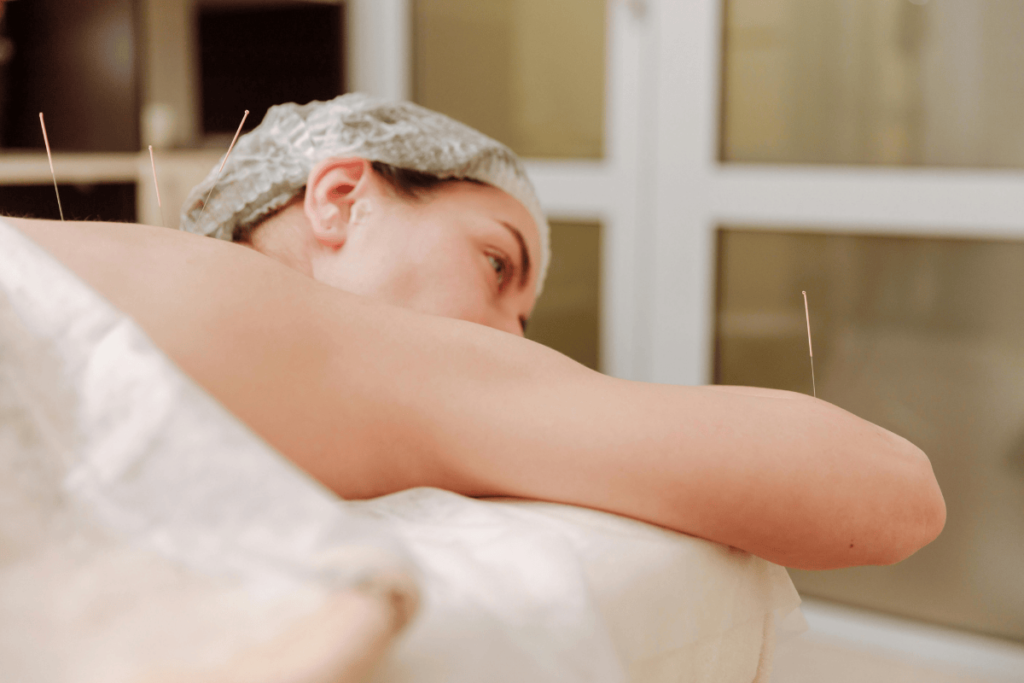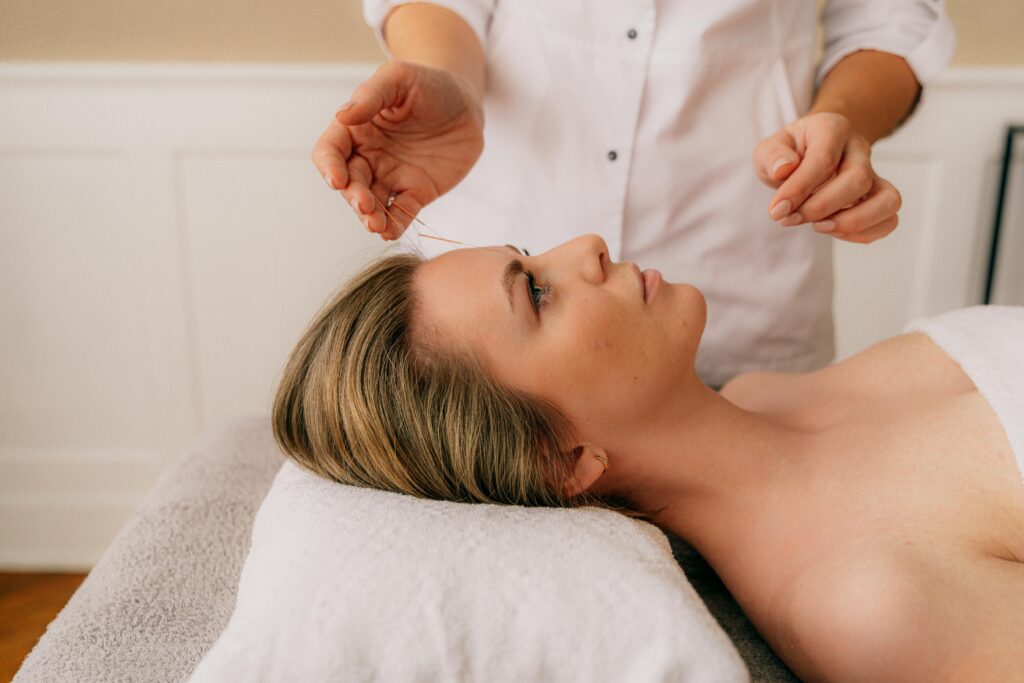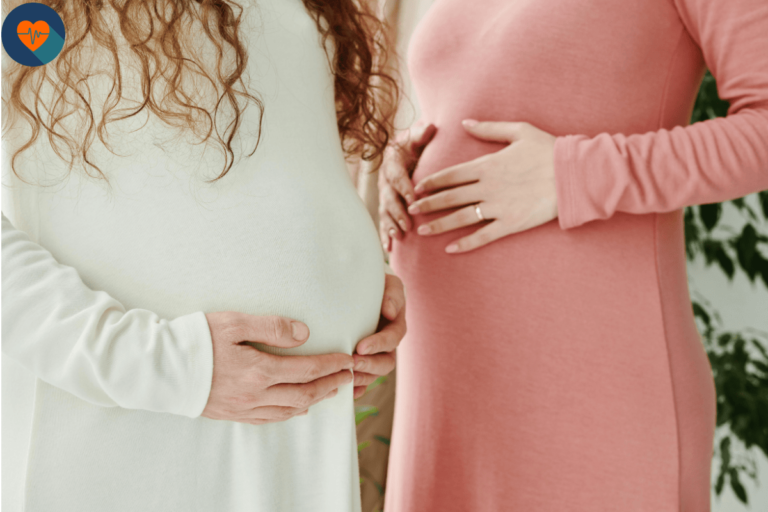For over 3,000 years, acupuncture has been a key part of traditional Chinese medicine. It offers a natural way to boost fertility. This ancient method involves putting fine, sterile needles into specific points on the body.
It helps the body heal itself and balance the vital life force called “Qi” Acupuncture can also help with fertility by improving blood flow and hormone balance. It can make eggs and sperm healthier.
Table of Contents

Understanding Traditional Chinese Medicine and Fertility
Traditional Chinese Medicine (TCM) sees fertility through the flow of Qi , or life force. It uses acupuncture to balance this flow in the body’s meridians. This helps improve reproductive health.
The Role of Qi in Reproductive Health
TCM believes a balanced Qi flow is key for fertility. Any imbalance can cause issues like irregular periods and low sperm quality. Acupuncture works to fix this, helping reproductive health.
Ancient Wisdom Meets Modern Medicine
TCM has always valued Qi and meridians for fertility. Now, science is backing up acupuncture’s benefits. Couples using TCM before IVF see better success rates.
Meridian Pathways and Fertility Points
Acupuncture focuses on special points along meridians like the Conception Vessel. These points help with menstrual cycles, ovulation, and uterine health. Skilled acupuncturists use these fertility points to tackle many reproductive issues.
| Meridian | Fertility-Focused Acupoints |
|---|---|
| Conception Vessel | CV4 (Guanyuan), CV6 (Qihai), CV8 (Shenque) |
| Thoroughfare Vessel | SP6 (Sanyinjiao), ST29 (Guilai) |
| Kidney Meridian | KI3 (Taixi), KI6 (Zhaohai) |
| Liver Meridian | LR3 (Taichong) |
Learning about Qi , meridians, and acupoints in reproductive health opens up TCM’s potential for fertility support.
How Acupuncture for Fertility Works
Acupuncture has been used for centuries to help with health issues, including fertility. It may improve fertility by boosting blood flow to reproductive organs, balancing hormones, and lowering stress.
For women, it can help regulate menstrual cycles, improve ovarian function, and thicken the uterine lining. This can all help with fertility. Acupuncture may also improve sperm count, motility, and morphology in men by increasing blood flow to the testes.
The ways acupuncture helps with fertility are complex. It works by stimulating specific points along the reproductive system and meridian pathways. These points are believed to affect the body’s natural healing processes and energy flow (Qi). By placing thin needles at these points, acupuncture may:
- Enhance blood circulation to the reproductive organs
- Maintain hormonal balance and support the endocrine system.
- Alleviate stress and anxiety, as they can adversely affect fertility.
- Improve egg and sperm quality
- Support implantation and early stages of pregnancy
Many studies show acupuncture’s effectiveness in boosting fertility, especially with IVF and IUI. Acupuncture can significantly increase the chances of successful embryo implantation during IVF treatments.
It’s important to start acupuncture treatments three to four months before trying to conceive or starting fertility treatments. This gives the body time to adjust and improve reproductive function. Fertility acupuncture sessions are usually recommended one to three times a week for the best results.
The Science Behind Fertility Acupuncture Treatment
Acupuncture is becoming a popular choice for those facing fertility issues. It’s not just from Chinese medicine anymore. Science has found out how it can boost reproductive health and fertility.
Impact on Blood Flow and Circulation
Research shows acupuncture boosts blood flow to key areas like the uterus and ovaries. This better circulation is key for healthy ovaries and a ready uterus. It’s vital for getting pregnant and for the embryo to stick.
Hormonal Balance and Regulation
Acupuncture helps balance hormones in the body. It works on the hormonal balance by affecting key parts of the body. This helps keep the menstrual cycle and ovulation on track.
Nervous System Response
Acupuncture also affects the nervous system regulation. It calms the nervous system, which can help with stress and anxiety. These are big hurdles for fertility. A calm nervous system can lead to better reproductive health.
It also has anti-inflammatory and immunomodulatory effects. These can help with infertility in both men and women.
More and more research supports acupuncture’s role in fertility. It can help with natural conception and improve IVF and IUI success rates.
Benefits for Women’s Reproductive Health
Acupuncture is a great help for women’s fertility and reproductive health. It has been shown to work well for many fertility problems. These include endometriosis, fibroids, polycystic ovarian syndrome (PCOS), and unexplained infertility.
Acupuncture helps regulate menstrual cycles and improves ovarian function. It balances hormones and supports regular ovulation. This may enhance the likelihood of conception. It also makes the uterine lining thicker, which is important for embryo implantation and a healthy pregnancy.
Acupuncture can also reduce side effects from fertility meds. These can include mood swings, hot flashes, and stomach problems. It helps lower stress and anxiety, making the body more receptive to fertility treatments.
For women using IVF or IUI, acupuncture is very helpful. It can improve embryo implantation chances before the transfer. After the transfer, it helps keep the pregnancy healthy.
Adding acupuncture to your fertility journey is a natural way to boost female fertility, menstrual regulation, and ovarian function. It tackles the root causes of fertility issues and promotes overall reproductive health. This makes acupuncture a holistic approach to getting pregnant.

Male Fertility Enhancement Through Acupuncture
Acupuncture is a natural way to boost male fertility. It increases blood flow to the testes. This can lead to better sperm production, movement, and shape. A 2019 study found that acupuncture greatly improved sperm quality in men.
Improving Sperm Quality and Count
Acupuncture offers many benefits for male fertility. Men who got acupuncture twice a week for five weeks saw a 16% better sperm health. They also had more sperm, even if they had low counts. Plus, it lowers scrotal temperature, which helps sperm grow.
Treatment Frequency for Male Patients
Men looking to improve fertility with acupuncture usually get treated once to three times a week. This regular treatment boosts sperm quality and count. It takes about 2.5 to 3 months for sperm to fully mature in the male body.
| Acupuncture Benefits for Male Fertility | Research Findings |
|---|---|
| Increased sperm count | 16% increase in sperm count and structural health |
| Improved sperm motility | Enhanced sperm motility and morphology |
| Decreased scrotal temperature | Beneficial for sperm production |
Adding acupuncture to their fertility plan, along with diet and lifestyle changes, can greatly help men. It can significantly increase their chances of getting pregnant and having a successful pregnancy.
Ideal Timing for Fertility Acupuncture Sessions
Timing is key when using acupuncture to boost fertility. Start treatments 3-4 months before trying to conceive or starting fertility treatments. This gives the ancient Chinese medicine time to work. It helps regulate your menstrual cycle, improves blood flow, and lowers stress.
Acupuncture serves as an excellent complement to IVF or IUI treatments.It can help during the stimulation phase, after egg retrieval, and before and after embryo transfer. Some suggest weekly sessions in the first trimester to support a healthy pregnancy.
It’s important to work with a skilled acupuncturist who focuses on fertility. This way, you can make a plan that combines acupuncture with your fertility treatments.
Acupuncture Timing for the 4 Menstrual Cycle Phases
- Menstruation Phase: Acupuncture helps regulate the cycle, address heavy flow and pain, and start building yin.
- Follicular Phase: Acupuncture helps develop a good quality follicle and egg, prepares the uterus, and nourishes yin.
- Ovulation Phase: Acupuncture supports the transition from yin to yang, boosts yang, ensures good Qi flow, and addresses stress and anxiety.
- Luteal Phase: Acupuncture supports the uterus and fetus, creates a warm environment, and helps maintain yang.
For the best results, do acupuncture for at least 3 full menstrual cycles. Have weekly sessions. This lets your body fully respond to the treatment and prepares you for a successful fertility journey.
Combining Acupuncture with IVF and IUI Treatments
Acupuncture is becoming a key part of fertility treatments like IVF and IUI. It helps improve the chances of getting pregnant. Patients find it useful in their journey to conceive.
Pre-Transfer Protocols
Acupuncture is crucial before the embryo transfer or insemination. It aims to boost egg quality and balance hormones. It also makes the uterus ready for implantation.
Specific points like CV4 and ST29 are used. They contribute to creating an optimal environment for the embryo.
Post-Transfer Support
After the procedure, acupuncture offers vital support. It helps reduce stress and improves blood flow to the uterus. This supports the implantation process.
Points like PC6 and DU20 are used to calm the mind and body. They help in relaxation.
Success Rate Enhancement
Studies show acupuncture can boost the success of IVF and IUI. It has been linked to higher clinical pregnancy rates in women undergoing IVF. It also helps in increasing endometrial thickness, which is key for implantation.
While the research is promising, more studies are needed. This will help refine acupuncture’s role in fertility treatments.
Working with a skilled acupuncturist can greatly benefit those trying IVF or IUI. Acupuncture addresses imbalances and supports natural fertility. It complements these treatments, enhancing their success.
Treatment Duration and Frequency Guidelines
Acupuncture for fertility varies in treatment length and frequency. A typical course of acupuncture sessions lasts 3-4 months before trying to conceive or starting treatments like IVF or IUI.
Fertility acupuncturists often recommend acupuncture sessions 1-3 times a week before conception. These sessions prepare the body and boost chances of a successful pregnancy.
During IVF or IUI cycles, acupuncture sessions may increase. Some suggest daily or every other day treatments around embryo transfer or insemination. This can improve the success of these treatments.
Experts also suggest continuing acupuncture in the first trimester of pregnancy. The frequency can then decrease to once a week or bi-weekly as the pregnancy advances.
It’s important to talk to your acupuncturist about your acupuncture sessions and fertility treatment timeline. This ensures the plan fits your unique needs and fertility goals.

Safety Considerations and Potential Risks
Acupuncture is usually safe and well-accepted when done by a skilled practitioner. Yet, there are some risks and things to think about.
Your initial fertility acupuncture session begins with a comprehensive health assessment. The acupuncturist will discuss your fertility history, lifestyle, and any medical concerns to develop a personalized treatment plan tailored to your needs.
The number and how often you get acupuncture depends on what you’re treating. Usually, you’ll have one or two sessions per week for about 6 to 8 treatments. Each session can last up to 60 minutes, but some might be shorter.
When doing acupuncture, some areas are more careful to avoid injuries. For example, the central nervous system. Also, if you’re on blood-thinning meds, tell your acupuncturist because of the risk of bleeding.
Not everyone reacts the same way to acupuncture. Some might feel relaxed or energized, while others might not notice anything. If you don’t see improvement in a few weeks, acupuncture might not be the best choice for you.
For fertility treatments, acupuncture is generally safe. But, timing your sessions right around ovulation and treatment cycles is key for best results. Always talk to your healthcare provider to make sure acupuncture fits safely into your fertility plan.
What to Expect During Your First Session
Your first acupuncture session for fertility starts with a detailed health review. The acupuncturist will talk about your fertility history and lifestyle. They also consider any medical concerns you have. This helps them create a treatment plan just for you.
Initial Consultation Process
The acupuncturist might do a physical exam, including tongue and pulse checks. This traditional Chinese medicine method helps find energy flow problems in your body. By knowing what’s causing your fertility issues, they can make a plan to help you.
Treatment Procedures
The treatment involves thin needles in specific body points. These points are chosen to help your body’s energy flow. The whole session lasts 30 to 60 minutes, helping you relax and heal.
Post-Session Care
After treatment, you’ll get care instructions from the acupuncturist. They might tell you to rest for at least an hour. They might also suggest herbs or diet changes to help your treatment work better.
FAQ
What is the role of qi in reproductive health?
Traditional Chinese Medicine sees fertility through the lens of Qi , the body’s energy. Acupuncture aims to improve Qi flow by targeting specific points. This helps enhance reproductive health.
How does acupuncture for fertility work?
Acupuncture may boost fertility by improving blood flow to reproductive organs. It also balances hormones and reduces stress. This can help regulate menstrual cycles and improve ovarian function.
What are the scientific benefits of fertility acupuncture?
Acupuncture can modulate the body’s nervous system and hormone balance. It may improve reproductive function. It also has anti-inflammatory and immunomodulatory effects that help with fertility.
How can acupuncture benefit women’s reproductive health?
Acupuncture helps women with various fertility issues. It can regulate menstrual cycles and improve ovarian function. It also enhances egg quality and uterine lining thickness.
How can acupuncture improve male fertility?
Acupuncture may boost male fertility by increasing blood flow to the testes. This can enhance sperm production, motility, and morphology.
When is the ideal time to start acupuncture for fertility?
Start acupuncture 3-4 months before trying to conceive or starting fertility treatments. During IVF cycles, use it during stimulation, after egg retrieval, and before and after embryo transfer.
How does acupuncture complement IVF and IUI treatments?
Acupuncture complements IVF and IUI treatments. Pre-transfer protocols aim to improve egg quality and uterine receptivity. Post-transfer support focuses on implantation and reducing stress.
What is the typical duration and frequency of acupuncture treatments for fertility?
Treatments for fertility are usually 1-3 times a week. The duration varies based on individual needs. A 3-4 month course is often recommended before trying to conceive or starting fertility treatments.
Is acupuncture for fertility safe?
Acupuncture is generally safe when done by a licensed practitioner. Risks include infection, injury to the central nervous system, or organ puncture if done improperly.
What can I expect during my first acupuncture session for fertility?
The first session includes a health review, including fertility history and lifestyle factors. Treatment involves inserting thin needles into specific points for 30-60 minutes. Patients may feel relaxed afterwards.

